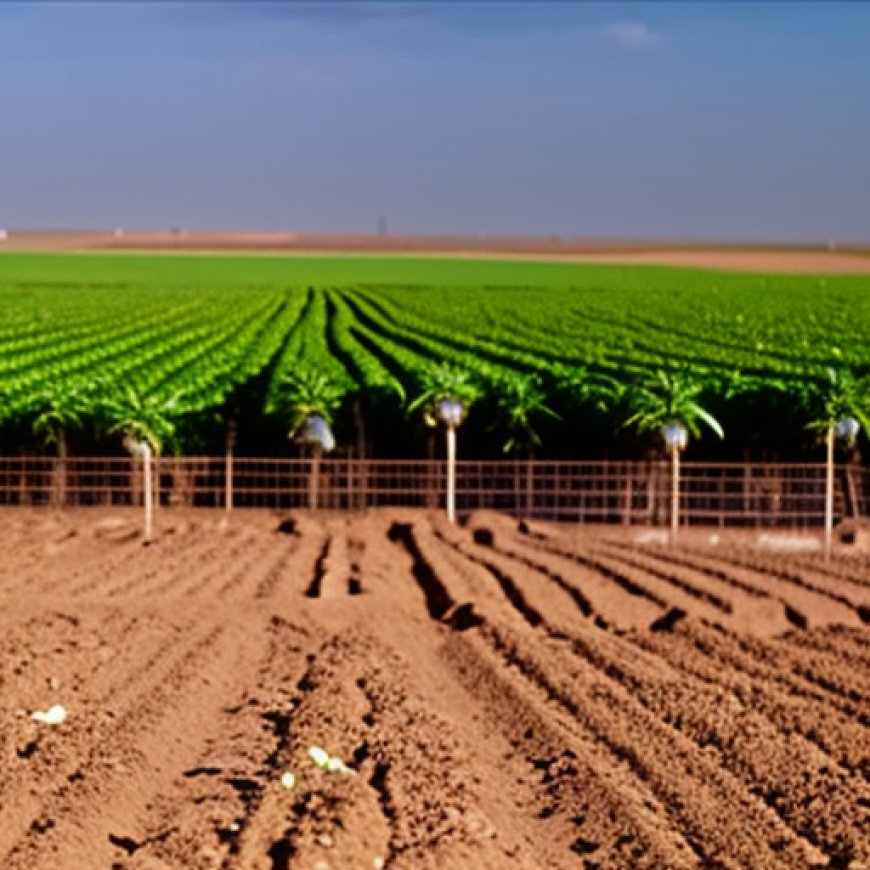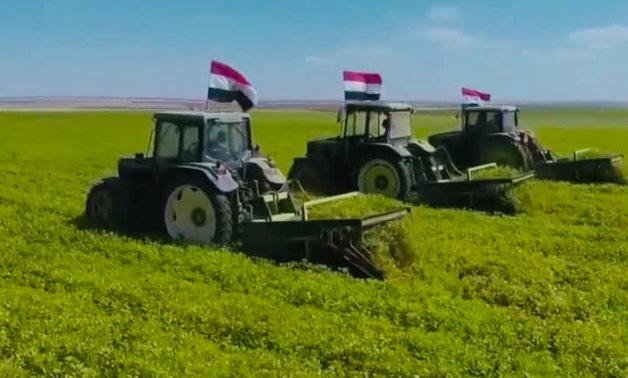Egypt’s Agricultural Development Plan: 6 key directives for 2023/24 unveiled
Egypt's Agricultural Development Plan: 6 key directives for 2023/24 ... Egypt Today


Egypt’s Agricultural Sector: A Report on Sustainable Development

Land reclamation as part of Egypt’s Future’ project for agricultural production- press photo
Introduction
Egypt’s agricultural sector stands as a pivotal component within the national framework of the economic and social reform program’s second phase. This phase particularly emphasizes the “real” economy and the structural reforms essential for its foundations.
Importance of Enhancing the Agricultural Sector
The need to enhance the agricultural sector becomes even more urgent given the escalating food requirements of the citizens, especially in light of the rapidly increasing population which has surpassed 105 million. Agriculture also plays a vital role in supplying primary and intermediary raw materials necessary for the country’s industrial advancement. This perspective is highlighted in the Economic and Social Development Plan for the fiscal year 2023/2024, introduced by Minister of Planning Hala Al-Saeed, and approved by both chambers of the Parliament.
Sustainable Development Dimensions of Agriculture
From a sustainable development standpoint, agriculture holds prominence across three dimensions: economic, social, and environmental.
- Economically, agriculture remains a primary source of employment.
- Socially, its significance emanates from ensuring food security for the masses. Given its expansive geographical span, it accommodates approximately 55% of the population in rural areas, generating income for families residing in these regions, which in turn aids in alleviating poverty.
- Environmentally, agricultural development is instrumental in increasing green areas, preserving biodiversity, combating desertification, and curbing various forms of pollution, whether terrestrial, aquatic, or atmospheric.
Paramount Directives for the Agricultural Sector
The Development Plan sheds light on the following paramount directives for the agricultural sector in the upcoming year:
- Amplifying Investments: Prioritizing horizontal and vertical expansion programs to meet citizens’ needs for essential strategic goods, aiming to elevate self-sufficiency levels, minimize dependency on imports, enhance productivity rates, and increase resource efficiency through the application of modern alternative agricultural technologies.
- Water Usage Rationalization: Continuous efforts in optimizing water utilization by promoting modern field irrigation projects, canal lining, rehabilitation, development of watercourses, and clearing and covering drains.
- Service Sector Efficiency: Redoubling efforts to enhance the efficiency of service sectors related to agriculture, such as transport, storage, logistics, commerce, and marketing. This will help reduce agricultural losses, facilitate access to both local and international markets, and yield substantial returns for farmers.
- Organic Farming Intensification: Emphasizing eco-friendly organic farming and the safe use of pesticides to upgrade the quality of agricultural products, guarantee food safety, and open up numerous marketing avenues.
SDGs, Targets, and Indicators in the Article
-
SDG 1: No Poverty
- Target 1.2: By 2030, reduce at least by half the proportion of men, women, and children of all ages living in poverty in all its dimensions according to national definitions.
- Indicator: The article mentions that agriculture generates income for families residing in rural areas, which helps alleviate poverty.
-
SDG 2: Zero Hunger
- Target 2.3: By 2030, double the agricultural productivity and incomes of small-scale food producers, in particular women, indigenous peoples, family farmers, pastoralists, and fishers, including through secure and equal access to land, other productive resources and inputs, knowledge, financial services, markets, and opportunities for value addition and non-farm employment.
- Indicator: The article mentions the need to enhance the agricultural sector to meet the escalating food requirements of the citizens.
-
SDG 8: Decent Work and Economic Growth
- Target 8.3: Promote development-oriented policies that support productive activities, decent job creation, entrepreneurship, creativity, and innovation, and encourage the formalization and growth of micro-, small-, and medium-sized enterprises, including through access to financial services.
- Indicator: The article emphasizes the need to enhance the efficiency of service sectors related to agriculture, such as transport, storage, logistics, commerce, and marketing, to yield substantial returns for farmers.
-
SDG 12: Responsible Consumption and Production
- Target 12.3: By 2030, halve per capita global food waste at the retail and consumer levels and reduce food losses along production and supply chains, including post-harvest losses.
- Indicator: The article mentions the importance of reducing agricultural losses to facilitate access to both local and international markets.
-
SDG 15: Life on Land
- Target 15.1: By 2020, ensure the conservation, restoration, and sustainable use of terrestrial and inland freshwater ecosystems and their services, in particular forests, wetlands, mountains, and drylands, in line with obligations under international agreements.
- Indicator: The article highlights that agricultural development is instrumental in increasing green areas, preserving biodiversity, and combating desertification.
Table: SDGs, Targets, and Indicators
| SDGs | Targets | Indicators |
|---|---|---|
| SDG 1: No Poverty | Target 1.2: By 2030, reduce at least by half the proportion of men, women, and children of all ages living in poverty in all its dimensions according to national definitions. | The article mentions that agriculture generates income for families residing in rural areas, which helps alleviate poverty. |
| SDG 2: Zero Hunger | Target 2.3: By 2030, double the agricultural productivity and incomes of small-scale food producers, in particular women, indigenous peoples, family farmers, pastoralists, and fishers, including through secure and equal access to land, other productive resources and inputs, knowledge, financial services, markets, and opportunities for value addition and non-farm employment. | The article mentions the need to enhance the agricultural sector to meet the escalating food requirements of the citizens. |
| SDG 8: Decent Work and Economic Growth | Target 8.3: Promote development-oriented policies that support productive activities, decent job creation, entrepreneurship, creativity, and innovation, and encourage the formalization and growth of micro-, small-, and medium-sized enterprises, including through access to financial services. | The article emphasizes the need to enhance the efficiency of service sectors related to agriculture, such as transport, storage, logistics, commerce, and marketing, to yield substantial returns for farmers. |
| SDG 12: Responsible Consumption and Production | Target 12.3: By 2030, halve per capita global food waste at the retail and consumer levels and reduce food losses along production and supply chains, including post-harvest losses. | The article mentions the importance of reducing agricultural losses to facilitate access to both local and international markets. |
| SDG 15: Life on Land | Target 15.1: By 2020, ensure the conservation, restoration, and sustainable use of terrestrial and inland freshwater ecosystems and their services, in particular forests, wetlands, mountains, and drylands, in line with obligations under international agreements. | The article highlights that agricultural development is instrumental in increasing green areas, preserving biodiversity, and combating desertification. |
Behold! This splendid article springs forth from the wellspring of knowledge, shaped by a wondrous proprietary AI technology that delved into a vast ocean of data, illuminating the path towards the Sustainable Development Goals. Remember that all rights are reserved by SDG Investors LLC, empowering us to champion progress together.
Source: egypttoday.com

Join us, as fellow seekers of change, on a transformative journey at https://sdgtalks.ai/welcome, where you can become a member and actively contribute to shaping a brighter future.







